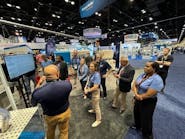By Karen Hanna
To all the manufacturers and other employers fretting about the challenges of attracting younger workers, youth employment coach Lorraine O’Moore has a piece of advice: Reach out.
As the director of work-based learning with Learning Grove/NaviGo College & Career Prep Services and the NKY College & Career Connector, O’Moore serves schools across 12 Kentucky counties. She coordinates with more than 220 employers, including 46 companies that perform advanced manufacturing — among them, KraussMaffei. The nonprofit’s mission centers on partnering with schools and employers to guide youth into the work world.
“All the robotics and everything that’s out now, these kids, if they see it, they’ll be fascinated by it. But they don’t see it because they don’t know about it, and their parents don’t know about it because they’ve never seen it,” O’Moore said.
Opening their facilities to younger people can help manufacturers overcome old stereotypes of factory work as dirty, back-breaking and boring, and attract new workers, she said.
To build its workforce, Learning Grove/NaviGo partner KraussMaffei has long offered co-op programs, apprenticeships and plant tours, said Mark Berens, manufacturing and Technology Center manager for the company.
It offers tours to high schoolers and actively recruits at Gateway Community & Technical College, which, like the company’s U.S. subsidiary, also is based in Florence, Ky.
Berens, who will mark his sixth anniversary with the maker of extrusion and injection molding machines this fall, said the number of young people interested in manufacturing has dwindled.
“Before COVID and all of that stuff hit, we saw a lot of these manufacturing-type, assembly-type jobs become fairly scarce,” Berens said. “So, we weren’t hit too hard with that a couple of years ago, but now we’re starting to see it more, especially in our field service departments where we’ve got a larger base of employees than we do on site here in Florence. But we’re definitely looking toward the apprenticeship program and our co-op programs to fill some of those gaps.”
According to a 2021 study by Deloitte and The Manufacturing Institute, the manufacturing skills gap in the U.S. could result in 2.1 million unfilled jobs by 2030.
Through Gateway and the Federation for Advanced Manufacturing Education (FAME), both Learning Grove/NaviGo partners, KraussMaffei has enjoyed the benefits of offering an apprenticeship program without having had to shoulder the burdens that can come with creating one, Berens said.
According to its website, FAME is a coalition of employers formed to support training programs. It operates in 12 states to help expand manufacturing education opportunities.
Berens said manufacturers struggling to find workers can benefit from working with such groups.
“If there’s a group like this in your area … as far as [Kentucky] FAME goes, they’re very helpful in getting things structured and organized in the right way, where it takes a lot of the stress off of folks like myself from the employer side, where I don’t have to worry about a lot of that day-to-day stuff because they’ve already done that foundational work,” he advised.
With Gateway, KraussMaffei offers an earn-as-you-learn program for high school graduates. The program lasts two years, with KraussMaffei taking on cohorts of between one and three participants. The company pays them as full-time employees and covers the cost of their associate’s degree in industrial manufacturing. Participants split time between the college, where they attend classes three days a week , and company, working two days a week at KraussMaffei.
“Primarily, we’re recruiting kids that are straight out of high school,” Berens said. “So, we’re definitely looking for people that are inquisitive, have a willingness to learn. Obviously, if they have some kind of mechanical or electrical aptitude, that’s helpful, but not necessary. We’re really just looking for people that are wanting to be engaged in the manufacturing process.”
Following graduation, participants must commit to continuing to work at KraussMaffei for two additional years.
The program not only allows KraussMaffei to build its workforce, but provides big benefits to participants, too, as Berens noted.
“One of the main things I tell all the apprentices when they start, I tell them, ‘I’m not a financial adviser, but this is going to be one of the best benefits they have, being able to contribute to a 401(k) at 18 years old and really set that foundation’ ... as opposed to somebody that maybe goes to a five-year college program and doesn’t start contributing to an account like that until they’re 24 or 25,” he said.
In addition to its outreach to high school graduates, KraussMaffei also works with college students who are pursuing engineering degrees.
Working primarily with the University of Cincinnati (UC), which requires its engineering students to alternate semesters in the classroom with semesters spent working, KraussMaffei offers co-ops. Pay levels for the program increase as students progress with their education.
“We can have a regular flow of that labor through our facility, through UC, so usually, at any given time, we have one to two mechanical, one to two electrical and one to two chemical engineers on staff through the University of Cincinnati,” Berens said.
He said most co-op students spend three or four months at a time at KraussMaffei.
By requiring co-ops, schools like UC offer opportunities for employers hunting for workers.
“Universities like UC, where they have so many terms that they always have students that are scrounging at the last minute to find opportunities, I think there’s always going to be an opportunity for companies that don’t have co-op programs to start their own,” Berens said.
For O’Moore, the employment journey begins long before companies land new workers. Companies that get to that step often are leveraging programs and partnerships just as KraussMaffei does in working with high school and college students.
She said one key is letting young people know what opportunities exist.
Testing of students in the counties served by Learning Grove/NaviGo has revealed a gap between the number of students with both the aptitude for certain jobs and the interest to do them. To O’Moore, that shows that too few students know about the kinds of career paths in which they might thrive.
Finding ways to show youths the technologies driving manufacturing could help close the gap, said O’Moore, who helps employers arrange tours and other events, such as summer camps and mentoring opportunities.
She’s encouraging employers to find ways to introduce young people to their business — a challenge for manufacturers that might have blanket bans against anyone under the age of 18 in their facilities.
But building relationships early is possible.
“Some of the others kind of maneuver around it, like KraussMaffei. We had two groups of kids — I think 85 in total — that toured two days in a row. One was really into the on-the-ground manufacturing, and the other was looking at the business, HR end of it, and they made it work,” she said. “They did an amazing job. They had stations within the facility, and then the kids were divided up into groups, and they had a flow, and they had someone at each station to talk to them about their career pathway and what they do there.”
At KraussMaffei, Berens said the ramifications of current and projected manufacturing job openings resonate far beyond Florence.
The company, he said, understands the whole industry relies on landing talent.
“It’s not uncommon for us to make recommendations, even to our recent graduates. ‘Hey, if we don’t have a position for you here at KraussMaffei, we can talk to some of our customers, or suppliers or vendors and say, ‘Hey, we’ve got this guy or girl, [and] they’re great,’ ” he said.
Karen Hanna, senior staff reporter
Contact:
Federation for Advanced Manufacturing Education, Washington, D.C.,
www.fame-usa.com
KraussMaffei Corp., Florence, Ky., 859-283-0200, www.kraussmaffei.com
Learning Grove/NaviGo College & Career Prep Services and the NKY College & Career Connector, Covington, Ky., 859-431-2075, www.navigoprep.com
Karen Hanna | Senior Staff Reporter
Senior Staff Reporter Karen Hanna covers injection molding, molds and tooling, processors, workforce and other topics, and writes features including In Other Words and Problem Solved for Plastics Machinery & Manufacturing, Plastics Recycling and The Journal of Blow Molding. She has more than 15 years of experience in daily and magazine journalism.







